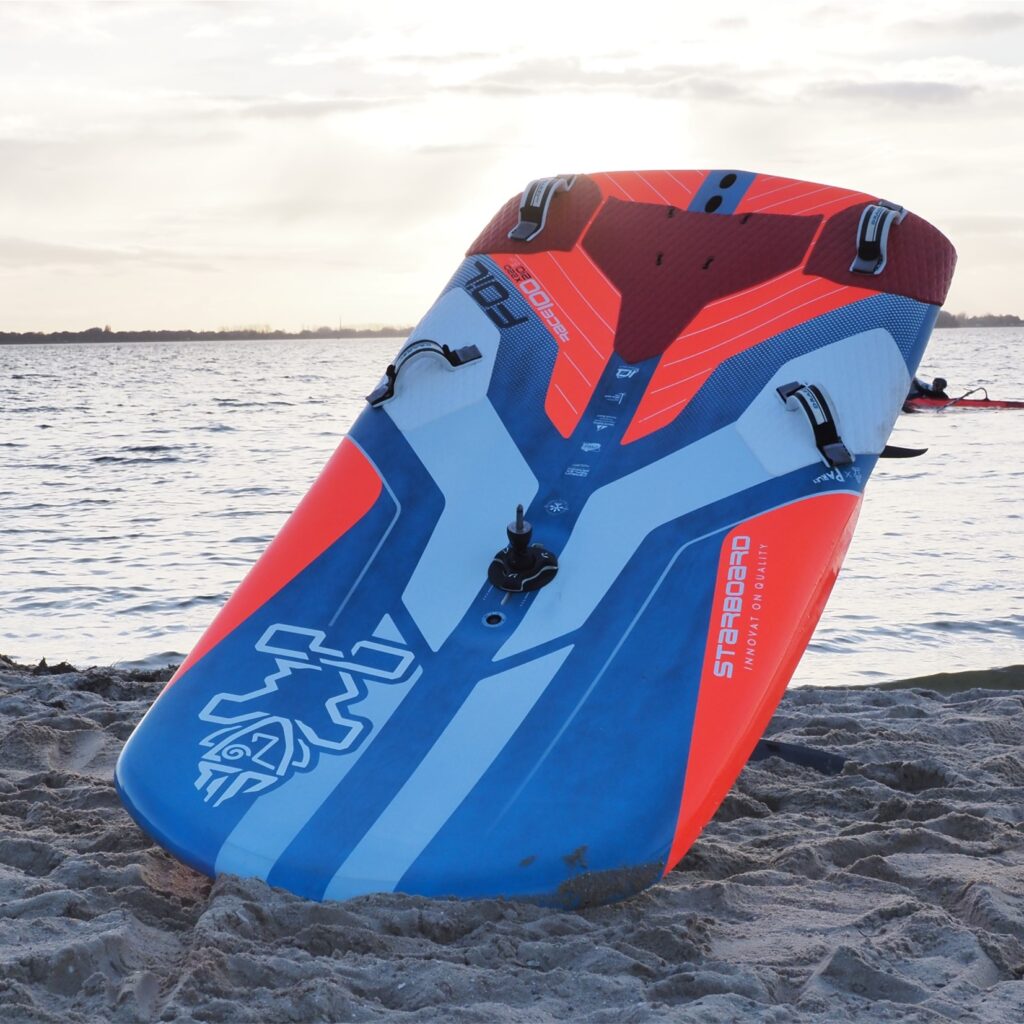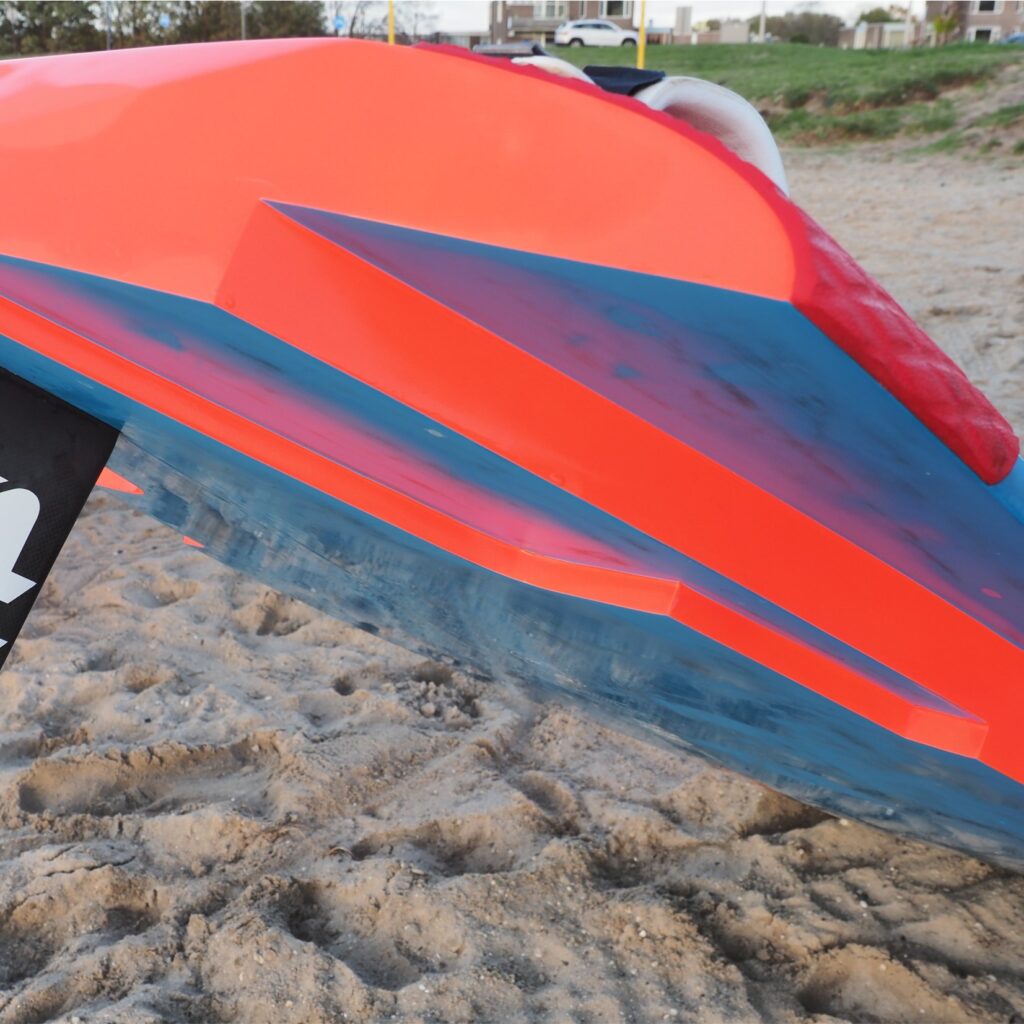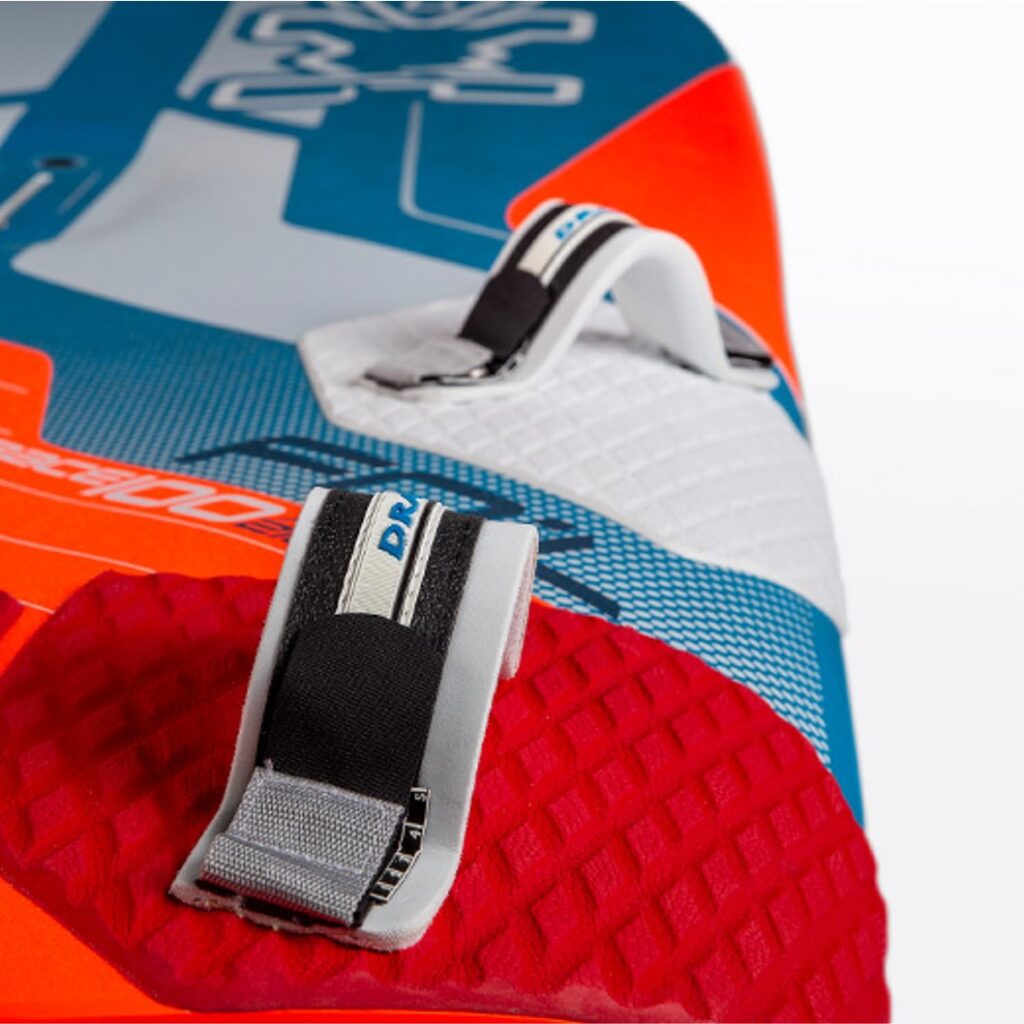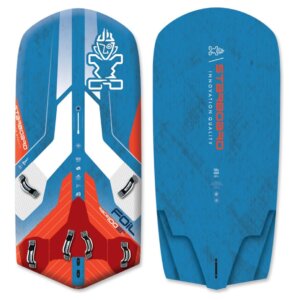Racing foiling has been dominated by the successful IQfoil competition class for a number of years. For those who want something different than the IQfoil set, there is not much left to choose from. The F4 Foils Race and the Starboard Race 100 are one of the few alternatives. We have extensively tested this set up and compared it with the IQfoil set. Where are the differences and is it better than the IQfoil? Read our review for all the details.
- F4 Foils Race foil: Carbon mast 97 cm | Fuselage 115 cm +10 | Front wing 945 cm2 | Back wing 230 cm2 | Price: € 3.139,-
- Starboard Race 100: Length 210 | Width 100 cm | Volume 213 liter | Weight 10,5 kg | Price € 2,949,-
F4 Foils Race foil fast and balanced
We have already thoroughly tested most F4 Foils and every time we experience the same characteristics; fast, easy to foil and good control with more wind. The F4 Foils Race foil has more or less the same characteristics. This is of course partly because the various parts such as the mast, front wing and back wing are also used with other F4 Foils. What makes racing foiling different from slalom foiling is that the lower wind range and being able to ‘point’ as high as possible with the wind is at least as important as the final speed. The Starboard IQfoil is still one of the best foils in the lower wind range and upwind. Especially if you replace the standard front wing with the 1,000 cm2 front wing.
With a surface area of 945 cm2, the front wing of the F4 Foils Race is exactly in between the 2 front wings of Starboard. At 230 cm2, the back wing is slightly smaller than the front wing of Starboard (255 cm2).
As with the other F4 Foils, we easily get on the foil and with every gust of wind, the foil accelerates faster than the Starboard IQfoil. Again we notice that the foil builds up nicely lift, but that the lift does not become much more as soon as we go faster. Even now we notice again (Ed. we already notice that with the F4 Foils Slalom Race foil and F4 Foils Freerace foil) that we can push longer and therefore go faster. The mast is much stiffer than the IQfoil mast. Especially for racing foils with the long fuselages, good torsional stiffness is very important. In addition to the lateral stiffness, the torsional stiffness of the F4 Foils mast is also very good. We notice this in particular with sharp steering, jibs and waves. The set remains much more stable, so we keep better control when things are going fast.
In terms of performance, the F4 Foils Race almost matched the set up with the Starboard 1,000 cm2 front wing. From about 9 knots, the F4 Foils is not only faster, but also runs about 5 degrees higher in the wind. In the very lower wind range (about 7 knots) the Starboard foil with the 1,000 cm2 builds up lift just a little faster and you can also stay in the air with about 7 knots just a little easier. The thin profile of the F4 Foils front wing needs a little more speed to build up enough lift.
We compare the F4 Foils Race with the standard IQfoil with 900 cm2 front wing. Then the lift off is the same with about 7 knots, but the F4 Foils as soon as you are on the foil is immediately faster and you can immediately point higher to the wind.
This F4 Foils Race with the 945 cm2 front wing is very long to keep. Sailing can effectively take up to 16 to 18 knots. After that, it is more efficient to grab a smaller wingset (front wing 850 cm2 and back wing 210 cm2).
The price of the F4 Foils Race is quite hefty at € 3,139. Especially compared to the price of the Starboard IQfoil (€ 2,799). We think the extra cost is more than worth it. You get a considerably stiffer mast and all in all the F4 Foils Race out performce the IQfoil in almost all areas a little bit. Although we have to say right away that it is ultimately up to the rider whether the potential is actually extracted. Another important plus is that you can upgrade the F4 foils with other wings and fuselages. For the Starboard IQfoil there is only 1 smaller front wing available.
Customize mast rake for course racing
The F4 Foils HM carbon mast was developed primarily for slalom foiling. The standard rake of the fuselage is about 3 degrees. For slalom foiling fine, but for light weather coarse racing way too much. By means of a handy rake spacers we easily adjust the angle of the mast;
- For little wind up to about 12 knots we foil with a rake of about 1.7 degrees for a quick take off and a lot of power on the back foot
- From 12 knots we foil with a rake of 2.2 to 2.5 degrees. This provides better control and the nose bounces off the water better
Starboard Race 100 foilboard upgrade from Starboard IQfoil 95
The Starboard Race 100 is clearly a ‘fine-tuned’ version of the well-known IQfoil board 95. The main differences are;
- Starboard Race 100 is 5 cm wider. Especially in the back, the board is a lot wider than the IQfoil 95
- The Starboard Race has even more volume with 213 liters
- The board is 10 cm shorter than the IQfoil 95
- The footband positions are slightly closer together compared to the IQfoil 95
The Starboard Race 100 is wide to the rear. Where the Starboard IQfoil 95 narrows slightly towards the rear, the Starboard Race 100 remains almost 1 meter wide in the back. The rear foot straps are relatively further inwards compared to the width in the back, so you stand with a flat foot on the deck. That takes some getting used to at first. We are so used to standing somewhat on the side of the board. After we are used to it, we notice that we can tilt upwind the board more easily, so that the up wind pushing is better, so we run upwind just a few degrees higher up wind. We also notice that we stay more comfortable when we go down wind, so we have more control and can push longer. It then feels more like on the Starboard X-15. On reaching courses we also stay more relaxed than on the IQfoil 95.



Starboard Race 100 low wind better than IQfoil 95
While foiling, we notice that the Starboard Race 100 is wider than the IQfoil 95. The board also requires larger wings and an 8.0m2 already feels quite small on this board. The board therefore feels slightly less all-round than the IQfoil 95. The board is really an up and down wind cannon. The pumping, getting into plane and the ‘lift off’ is similar to the IQfoil 95. Due to its extra width, you can clearly push the board better upwind and down wind, add to that the better standing position on the board, those are the main differences that ensure that you get to the upper buoy a little earlier than with the IQfoil 95, especially in the lower wind range up to about 12 to 14 knots. If the wind is blowing harder, the 2 boards are tied.
The F4 Foils Race with the front wing of 945 cm2 matches very well with the board. The Starboard IQfoil foil with 900 cm2 front wing feels a bit ‘under powered’. The IQfoil with the front wing of 1000 cm2 fits better with this board. The Severne HGO size 9.0m2 feels relatively compact. As a result, we experience a little more control. With a 10 m2 on this board you really have the ultimate light weather set.
At a time when all surfing equipment is becoming more expensive, the price of € 2,949 is not too bad. The Starboard IQfoil 95 now costs € 3,149,-. Are you looking for an uncompromising board for up- and down wind and do you not sail IQfoil competitions? Then the Starboard Race 100 is a very interesting alternative to the IQfoil 95. Our advice is to combine this board with the F4 Foils Race tested above or the Starboard Formula carbon Foil of 2022.
Want to test F4 Foils Race foil or Starboard Race 100 yourself?
Do you want to test the F4 Foils Race foil or Starboard Race 100? That allows us to have the most common products available for testing. Testing of material is only possible by appointment. We are also happy to help with the tuning of the board of foil. If you have any questions or would like to make a test appointment, please send us an email.



